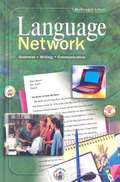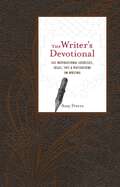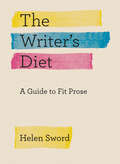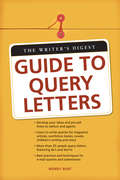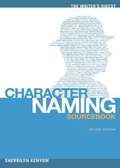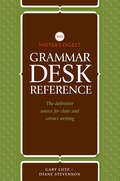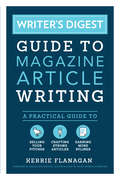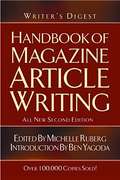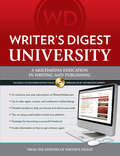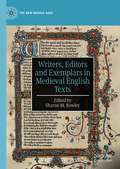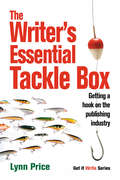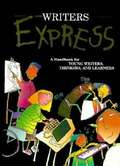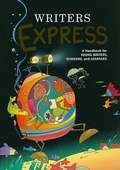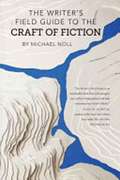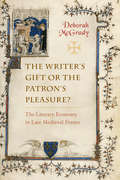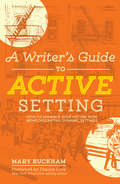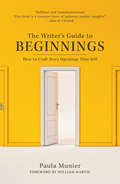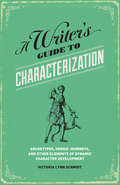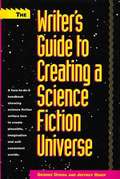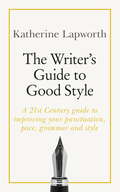- Table View
- List View
The Writer's Craft (Gold Level)
by Sheridan Blau Peter Elbow Don Killgallon Rebekah CaplanCompilation of writing excerpts and exercises that will teach you to be a better writer and reader.
The Writer's Craft (Gold Level)
by Mcdougal LittellIn each of the Writer's Workshops, you will experiment with ideas and approaches as you are guided through a complete piece of writing. Cross-references to the Handbooks will allow you to find additional help when you need it. Then, as you write, you will discover what you think about yourself--and about the world around you.
The Writer's Craft Green Level Grade 8
by Mcdougal LittellEducational book for grade 8 students. Contains writer's workshops with guided and related assignments, a writing handbook with mini-lessons in writing process, style, and academic skills; and a grammar and usage handbook with mini-lessons in grammar, usage, and mechanics.
The Writer's Craft (Red Level)
by Mcdougal LittellThis book helps one discover the excitement in writing and become a great writer.
The Writer's Devotional: 365 Inspirational Exercises, Ideas, Tips & Motivations on Writing
by Amy PetersWhether youre writing fiction or nonfiction, screenplays or poetry, or simply trying to keep a more compelling journal or blog, this invaluable volume, filled with 365 inspiring quotations and informative tutorials, will get your creative juices flowing. Each day of the week focuses on a different aspect of the writing life, from the business of writing, to the nuts and bolts of editing, to tips and tricks for getting past writers block.
The Writer's Diet: A Guide to Fit Prose (Chicago Guides to Writing, Editing, and Publishing)
by Helen SwordDo your sentences sag? Could your paragraphs use a pick-me-up? If so, The Writer's Diet is for you! It's a short, sharp introduction to great writing that will help you energize your prose and boost your verbal fitness. Helen Sword dispenses with excessive explanations and overwrought analysis. Instead, she offers an easy-to-follow set of writing principles: use active verbs whenever possible; favor concrete language over vague abstractions; avoid long strings of prepositional phrases; employ adjectives and adverbs only when they contribute something new to the meaning of a sentence; and reduce your dependence on four pernicious "waste words": it, this, that, and there. Sword then shows the rules in action through examples from William Shakespeare, Emily Dickinson, Martin Luther King Jr. , John McPhee, A. S. Byatt, Richard Dawkins, Alison Gopnik, and many more. A writing fitness test encourages you to assess your own writing and get immediate advice on addressing problem areas. While The Writer's Diet is as sleek and concise as the writing ideals contained within, this slim volume packs a powerful punch. With Sword's coaching writers of all levels can strengthen and tone their sentences with the stroke of a pen or the click of a mouse. As with any fitness routine, adhering to the rules requires energy and vigilance. The results, however, will speak for themselves.
The Writer's Digest: Guide to Query Letters
by Wendy Burt-ThomasMake That Crucial, Positive First Impression Anyone who's researched the marketplace knows: The path to publication begins with your query letter. If your query is weak, unfocused, or uninspired, an editor or agent won't even bother to request your article, novel manuscript, or nonfiction book proposal. But a well-crafted, compelling query sent to the right editor or agent is an essential sales tool for fiction writers and the most effective way for nonfiction writers to pre-sell your idea. In this book, professional freelance writer and magazine editor Wendy Burt-Thomas shares practical advice on how to craft persuasive letters that connect with editors and agents and ultimately generate sales for you. You'll learn how to: Conduct targeted research to find suitable editors and agents Hook an editor with a tantalizing lead and shape a summary that compels editors to buy Select the strongest slant for your book or article Use research and interview shortcuts that keep your query prep profitable Make your query rejection-proof by weeding out subtle mistakes that can sabotage your project Communicate your author platform and sell yourself as the best writer for the subject Complete with dozens of sample queries–some that landed article assignments, agents, or book deals, and others that never stood a chance–this book offers you a comprehensive strategy for presenting your writing ideas in a way that will increase your chances of publication. Though the title may lead some to believe it's strictly to be shelved as a reference manual,The Writer's Digest Guide to Query Lettersis a smooth read from cover to cover.
The Writer's Digest Character Naming Sourcebook
by Sherrilyn KenyonThis reference for writers provides meanings for some 25,000 names and surnames from 45 countries, listed by origin. An explanation of naming practices and historical context is provided for each origin section, and there is a reverse lookup of names by meaning, as well as an alphabetical index of names. An introduction gives practical advice on naming characters and places plus tips on naming for specific genres, and sidebars within the entry sections tell how published authors solved their naming dilemmas. Kenyon (whose name means Blond from the White Meadow) is a fantasy author. Annotation ©2006 Book News, Inc., Portland, OR (booknews.com)
Writer's Digest Grammar Desk Reference: The Definitive Source for Clear and Concise Writing
by Gary LutzThe Definitive Source for Clear and Correct WritingEngaging but not flip, thorough but not overwhelming, Writer's Digest Grammar Desk Reference is the perfect addition to anyone's desk.This guide provides:Comprehensive grammar instruction--readers won't need any other guideReal-world examples and errors from well-known magazines and newspapers, making the advice even more relevantA user-friendly package with a concealed wire binding, a colored tab system, and sidebars for easy referencePractical, thorough, and accessible, Writer's Digest Grammar Desk Reference speaks to a hole in the market: good grammar instruction that's reader-friendly, fun to read, easy-to-understand, and correct.
Writer's Digest Guide to Magazine Article Writing: A Practical Guide to Selling Your Pitches, Crafting Strong Articles, & Earning More Bylines
by Kerrie Flanagan Angela MackintoshYour Essential Reference for Writing for Magazines! In The Writer's Digest Guide to Magazine Article Writing, accomplished freelance writer, author, and instructor Kerrie Flanagan demystifies the idea that writing for magazines is a difficult process meant only for those with journalism degrees. Drawing from her 20 years as a freelance writer and instructor, Flanagan takes you step-by-step through the entire process, sharing her knowledge and experiences in a friendly, conversational way. With more than a dozen sample articles, expert advice from magazine editors and successful freelance writers, practical tips on researching potential publications and instructions on crafting compelling query letters, you'll find the tools needed to write and publish magazine articles. In this book you'll learn how to:Find and target ideas for the right magazine.Develop effective query letters to catch the attention of editors and land more assignments.Organize your writing life using the checklists and tools throughout the book.Understand and negotiate contracts.Write and sell personal essays to consumer, niche and trade magazines.Whether your goal is to get your first byline or make the switch from part-time freelancer to full-time writer, The Writer's Digest Guide to Magazine Article Writing is your go-to resource for writing success.
Writer's Digest Handbook of Magazine Article Writing
by Jean M. FredetteAn excellent reference book for writers who want to publish in magazines. In this collections of articles, successful writers share strategies for such necessities as querying editors, finding material, revising the article, closing the article.
Writer's Digest Handbook Of Magazine Article Writing
by Michelle Ruberg Ben YagodaThis book is the only resource writers need for all of their questions on how to: brainstorm creative article ideas; find the right magazine for their work; and keep editors coming back for more!
Writer's Digest Handbook of Magazine Article Writing (2nd edition)
by Michelle Ruberg"This book is packed with practical information you can put to use today, whether you're just starting your freelance career or trying to keep pace with changing expectations and opportunities. As someone who's worked on both sides of the table, as a magazine freelancer and an editor, I can tell you that the advice between these covers can save you years worth of rejection slips and frustration." -Kristin D. Godsey (editor of Writer's Digest magazine)
Writer's Digest University: Everything You Need to Write and Sell Your Work
by From The Editors Of Writer's DigestEverything You need to Write and Sell Your Work This is the ultimate crash course in writing and publishing! Inside you'll find comprehensive instruction, up-to-date market listings, and more. Writer's Digest University is the perfect resource for you, no matter your experience level. This one-stop resource contains: Quick and comprehensive answers to common questions including: "How do I write a successful novel?" and "How do I know if self-publishing is right for me?" Instruction and examples for formatting and submitting fiction, nonfiction, articles, children's writing, scripts, and verse. Advanced instruction on business-related issues like marketing and publicity, using social media, freelancing for corporations, keeping finances in order, and setting the right price for your work. A detailed look at what agents want and how to get one that best fits your needs. Market listings for publishers and agents open to unsolicited work and new writers, contests and awards, and conferences and workshops. Get started now with everything you need to build a thriving writing career. Whether you're starting from scratch or have a bit of experience, you'll find the tools you need for success.
Writers, Editors and Exemplars in Medieval English Texts (The New Middle Ages)
by Sharon M. RowleyThis collection of essays explores the literary legacy of medieval England by examining the writers, editors and exemplars of medieval English texts. In order to better understand the human agency, creativity and forms of sanctity of medieval England, these essays investigate both the production of medieval texts and the people whose hands and minds created, altered and/or published them. The chapters consider the writings of major authors such as Chaucer, Gower and Wyclif in relation to texts, authors and ideals less well-known today, and in light of the translation and interpretive reproduction of the Bible in Middle English. The essays make some texts available for the first time in print, and examine the roles of historical scholars in the construction of medieval English literature and textual cultures. By doing so, this collection investigates what it means to recover, study and represent some of the key medieval English texts that continue to influence us today.
The Writer's Essential Tackle Box
by Lynn PriceThe Writer's Essential Tackle Box offers an insider's view that informs and educates writers to key occupations that comprise the publishing industry--how they work, why they work, and pitfalls to avoid. A must-read for the new author seeking guidance through every aspect of the murky waters of publishing.
Writer's Express: A Handbook for Young Writers, Thinkers and Learners
by Dave Kemper Ruth Nathan Patrick SebranekWriter's Express helps make writing an important part of your life, no matter if you are completing assignments in school or working on writing projects in your own neighborhood. The book is loaded with all kinds of great writing ideas and is divided into five major parts: 1. The Process of Writing, 2. The Forms of Writing, 3. The Tools of Learning, 4. The Proofreader's Guide, and 5. The Student Almanac.
Writers Express: A Handbook for Young Writers, Thinkers and Learners
by Dave Kemper Patrick Sebranek Ruth Nathan Chris KrevzkeThis story is not unusual. Kids have been writing and acting out plays for a long time. Writing is a great way to express what you think or fell or imagine. That's why people write, and that's why we've create Writers Express for you. We also hope it help is helps you become a better reader, thinker, speaker, an all-around student. Not bad for one little book!
The Writer's Field Guide To The Craft Of Fiction
by Michael NollTHE WRITER'S FIELD GUIDE offers a refreshing approach to the craft of fiction writing. It takes a single page from forty contemporary novels and short stories, identifies techniques used by the writers, and presents approachable exercises and prompts that allow anyone to put those techniques to immediate use in their own work. Encompassing everything from micro (how to "write pretty") to macro (how to "move through time space"), and even how to put all together on page one, this a field guide for anyone who wants to start writing now.
The Writer's Gift or the Patron's Pleasure?: The Literary Economy in Late Medieval France
by Deborah McGradyThe Writer’s Gift or the Patron’s Pleasure? introduces a new approach to literary patronage through a reassessment of the medieval paragon of literary sponsorship, Charles V of France. Traditionally celebrated for his book commissions that promoted the vernacular, Charles V also deserves credit for having profoundly altered the literary economy when bypassing the traditional system of acquiring books through gifting to favor the commission. When upturning literary dynamics by soliciting works to satisfy his stated desires, the king triggered a multi-generational literary debate concerned with the effect a work’s status as a solicited or unsolicited text had in determining the value and purpose of the literary enterprise. Treating first the king's commissioned writers and then canonical French late medieval authors, Deborah L. McGrady argues that continued discussion of these competing literary economies engendered the concept of the “writer’s gift,” which vernacular writers used to claim a distinctive role in society based on their triple gift of knowledge, wisdom, and literary talent.
A Writer's Guide to Active Setting: How to Enhance Your Fiction with More Descriptive, Dynamic Settings
by Dianna Love Mary BuckhamEnhance Your Fiction with the Power of an Active Setting!Setting is one of the most underutilized and misunderstood elements of the writing craft. And when writers do focus on setting, they often pull readers out of the narrative and jolt their attention from the action on the page.A Writer's Guide to Active Setting will show you how to create vivid, detailed settings that bring your story to life. You'll learn how to deepen character development, anchor readers to a specific time and place, reveal backstory without slowing things down, elevate action sequences, and more.Drawing upon examples from authors writing across a variety of genres, Mary Buckham will illustrate exactly how the proper use of setting can dramatically improve your story. You'll learn what's effective about each passage and how you can use those techniques to make your story shine."Takes an all too often overlooked technique, and elevates it to a next-level game changer for powerful fiction." --Cathy Yardley, author of Rock Your Plot"A powerful combination of fresh insights, practical examples, and how-to advice on the often overlooked but critical element of setting...written in a quick-to-read and easy-to-understand style, and packed with useful application exercises." --Kelly L. Stone, author of Thinking Write: The Secret to Freeing Your Creative Mind"If you're a writer, then Mary Buckham's book is a must-have tool for your writer's toolkit. Creating settings that are rich and believable is not an easy task, but with this book, I found that each chapter gave me great tips that I could immediately implement in my manuscript." --Laurie G. Adams, author of Finding Atticus
The Writer's Guide to Beginnings: How to Craft Story Openings That Sell
by William Martin Paula MunierGive your story its best start! The best beginnings possess a magical quality that grabs readers from the first word and never lets them go. But beginnings aren't just the door into a fictional world. They are the gateway to the realm of publishing--one that could shut as quickly as it opens. In The Writer's Guide to Beginnings, author and literary agent Paula Munier shows you how to craft flawless beginnings that impress agents, engage editors, and captivate readers. You'll learn how to develop the big idea of your story and introduce it on page one, structure opening scenes that encompass their own story arc, kickstart your writing with effective brainstorming techniques, and introduce a compelling cast of characters that drive the plot. You'll also examine the best-selling novels from different genres to learn the secrets that experienced writers use to dive straight into a story. With thorough examinations of voice, point of view, setting, dialogue and conflict, The Writer's Guide to Beginnings is a must-have tool for luring your readers in with your opening pages--and convincing them to stick around for the ride. "Writing a book? Hard. Writing the beginning of a book? Rocket science! Strap on your spacesuit, because thanks to Munier's nuanced, actionable breakdown of every possible aspect of a gripping opening, authors everywhere can now take their books to the stars." --K.M. Weiland
A Writer's Guide to Characterization: Archetypes, Heroic Journeys, and Other Elements of Dynamic Character Development
by Victoria Lynn SchmidtDevelop compelling character arcs using the power of myth! In the best novels, characters undergo dramatic changes that keep readers turning pages. A Writer's Guide to Characterizationshows you how to develop such meaningful character arcs in your own work--stories of transformation that will resonate with readers long after the story ends. In this comprehensive guide, author Victoria Lynn Schmidt examines cross-cultural archetypes to illustrate how they can make your work more powerful and compelling. Plus, you'll learn how to draw from Jungian psychology to add complexity and believability to your characters. Schmidt also provides: 40 lessons on character development (with examples from well-known films and novels) that you can apply to your own work Questionnaires and exercises to help you select male and female archetypes and adapt them to your story 15 classic animal archetypes (including the coyote, snake, tiger, and butterfly) you can use to build convincing character profiles WithA Writer's Guide to Characterization, you'll have the information you need to infuse the development of your characters with drama and authenticity.
The Writer's Guide to Creating a Science Fiction Universe
by George Ochoa Jeffrey OsierTo hold the interest of knowledgeable sci-fi readers, a writer the genre must stay within certain fuzzy boundaries of scientific belief. This volume provides some of the scientific detail that will make a writer's adventures compelling and consistent with current views of the universe. Annotation c. by Book News, Inc. , Portland, Or.
The Writer's Guide to Good Style: A 21st Century guide to improving your punctuation, pace, grammar and style
by Katherine LapworthLEARN HOW TO LIFT YOUR CREATIVE WRITING BY EMPLOYING A GOOD WRITING STYLE.Do you want to write more effectively, correctly and in a manner which is appropriate for this brave new world of text speak and blogging?Whether you are a professional writer, or writing for your profession, a journalist, non-fiction writer, or simply a would-be blogger, you will find essential guidance and the latest style rules in this book.It contains firstly a detailed breakdown of both the rules of grammar, punctuation and spelling and, secondly, a guide to making your work readable, structured and well-paced. Unlike any other style guide, it also sets out the new and evolving rules for 21st century writing such as blogging, chatrooms, and even PowerPoint presentations.ABOUT THE SERIESThe Teach Yourself Creative Writing series helps aspiring authors tell their story. Covering a range of genres from science fiction and romantic novels, to illustrated children's books and comedy, this series is packed with advice, exercises and tips for unlocking creativity and improving your writing. And because we know how daunting the blank page can be, we set up the Just Write online community at tyjustwrite, for budding authors and successful writers to connect and share.

